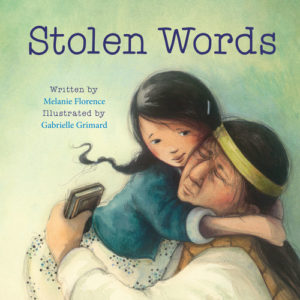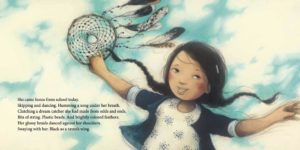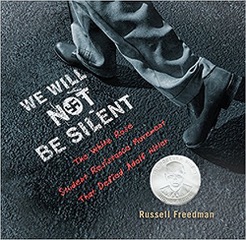 Writing about the ravages of colonial control over First Nations in the United States and Canada is difficult enough when addressing adults. It’s even more challenging when presenting material to the youngest readers. How to convey the seriousness and depth of pain without crushing the spirit of the child reader–it’s a huge challenge, and I admire any author who even attempts to take it on. Few come out with such a successful result as author Melanie Florence in her picture book Stolen Words about her grandfather’s forced enrollment in boarding school and the loss of his mother tongue. Ms. Florence tells the story of a young girl who innocently asks her grandfather how to say grandpa in Cree. He tells her about being taken away from home and punished at the boarding school for speaking his Cree language. Illustrator Gabrielle Grimard captures this beautifully representing the Cree language as a blackbird captured in a cage and locked away. It’s an image that conveys the sadness and brutality of the Canadian boarding school without presenting images too heart-breaking for young readers. The girl finds a Cree dictionary in her own school and brings it to her grandfather and the words on the page, again symbolically, take the fo
Writing about the ravages of colonial control over First Nations in the United States and Canada is difficult enough when addressing adults. It’s even more challenging when presenting material to the youngest readers. How to convey the seriousness and depth of pain without crushing the spirit of the child reader–it’s a huge challenge, and I admire any author who even attempts to take it on. Few come out with such a successful result as author Melanie Florence in her picture book Stolen Words about her grandfather’s forced enrollment in boarding school and the loss of his mother tongue. Ms. Florence tells the story of a young girl who innocently asks her grandfather how to say grandpa in Cree. He tells her about being taken away from home and punished at the boarding school for speaking his Cree language. Illustrator Gabrielle Grimard captures this beautifully representing the Cree language as a blackbird captured in a cage and locked away. It’s an image that conveys the sadness and brutality of the Canadian boarding school without presenting images too heart-breaking for young readers. The girl finds a Cree dictionary in her own school and brings it to her grandfather and the words on the page, again symbolically, take the fo rm of blackbirds and fly free. It’s a simple tale–too simple for older readers certainly who need much more substance and a less tidy resolution. But for the youngest readers this is an important story of native language denied and ultimately regained, and a book well worth celebrating.
rm of blackbirds and fly free. It’s a simple tale–too simple for older readers certainly who need much more substance and a less tidy resolution. But for the youngest readers this is an important story of native language denied and ultimately regained, and a book well worth celebrating.
Stolen Words is published by Second Story Press out of Toronto, Ontario. It will be available in September of 2017. I wrote this review from an Advanced Reader Copy which I obtained at the independent bookstore where I work. If you are looking for more context as an adult reader I highly recommend They Called Me Number One by Bev Sellars, and acclaimed author from British Columbia. She is a chief of the Xat’sull and her book is about her own experiences in boarding school. It’s not a read for the tenderhearted but it is very useful in understanding the depth of wrong that was done in Indian boarding schools across the Unites States and Canada.

 We Will Not Be Silent: The White Rose Student Resistance Movement That Defied Adolf Hitler is the story of Austrian teenagers Hans and Sophie Scholl who at the beginning of Hitler’s rise to power were glad to join the Hitler youth which they saw as a patriotic organization. But as the Hilter Youth moved from scout-like campouts to militia training and racist indoctrination, the Scholl siblings knew they had to resist at any cost. They put together The White Rose, a society devoted to making Hitler’s war crimes known and turning the tide ofGerman popular opinion against the Nazis. They succeeded, although it cost their lives. Freemen’s book is well researched and includes many historical photographs and yet it handles this very dark subject matter in such a way that most elementary school students can understand without being emotionally overwhelmed.
We Will Not Be Silent: The White Rose Student Resistance Movement That Defied Adolf Hitler is the story of Austrian teenagers Hans and Sophie Scholl who at the beginning of Hitler’s rise to power were glad to join the Hitler youth which they saw as a patriotic organization. But as the Hilter Youth moved from scout-like campouts to militia training and racist indoctrination, the Scholl siblings knew they had to resist at any cost. They put together The White Rose, a society devoted to making Hitler’s war crimes known and turning the tide ofGerman popular opinion against the Nazis. They succeeded, although it cost their lives. Freemen’s book is well researched and includes many historical photographs and yet it handles this very dark subject matter in such a way that most elementary school students can understand without being emotionally overwhelmed.